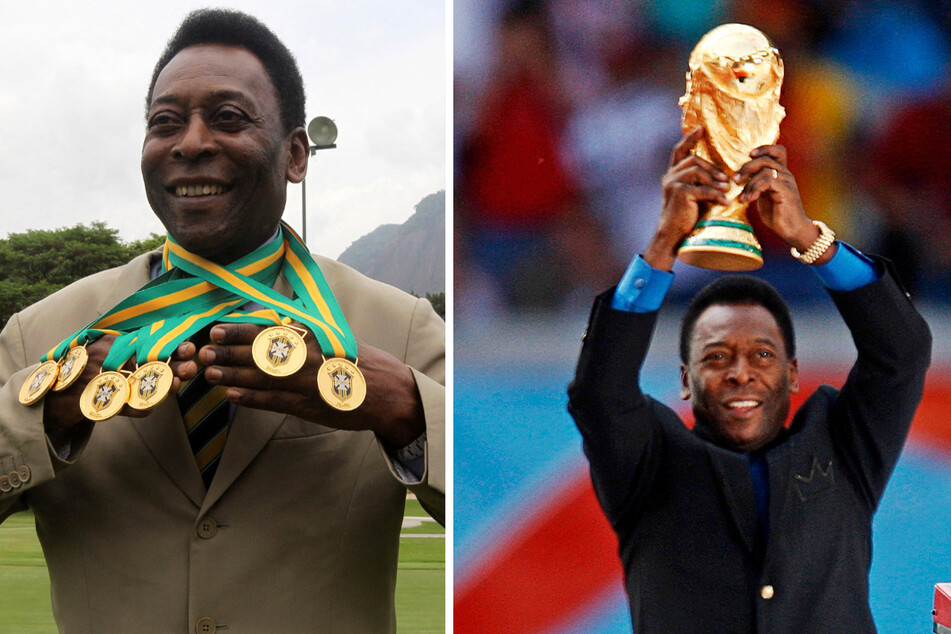Pelé, Brazilian soccer legend, has died
São Paulo, Brazil - Brazil soccer great Pelé has died at the age of 82, the Hospital Israelita Albert Einstein in São Paulo where he was being treated has confirmed.

The only athlete to ever win three World Cups passed away after battling colon cancer for over a year. He had been in the hospital since November, in a period in which he also received treatment for a respiratory infection.
His daughter announced his death on Thursday in an Instagram post while his agent, Joe Fraga, also confirmed his death.
The Brazilian legend is one of soccer's most iconic figures, and remains the marker to whom modern greats such as Lionel Messi and Cristiano Ronaldo are compared.
Born as Edson Arantes do Nascimento on October 23, 1940, in the town of Três Corações (Three Hearts) in the state of Minas Gerais, Pelé became known in Brazil as the "King of Football." He won the World Cup three times, in 1958, 1962, and 1970.
Pelé's achievements have been celebrated with countless individual accolades, including being a joint winner of FIFA's Player of the Century with Diego Maradona in 2000.
Pelé was football's ultimate fox in the box, a player who dealt in quantity as much as quality, whose eye-popping career statistics alone marked him out as one of the greats. After a brief retirement, Pele eventually closed out his career playing for the New York Cosmos.
Pele spent his later years working as an ambassador for a variety of charitable causes and commercial partners, but it is his magic on the field that will forever set the benchmark. The Brazil great became as globally revered as The Beatles and Muhammad Ali, who became peers of his, and his death has sent a shudder through the sports world.
With tributes flooding in after the Brazil icon passed away, the star's incredible career speaks for itself.
Pelé: The World Cup's finest

While any debate over the greatest player of all time will always be subjective, nobody can deny Pelé his status as the ultimate World Cup legend.
Footage is scarce of the player who emerged as a teenage sensation in the late 1950s and shone on the world stage for almost 15 years. That which is available shows a nimble forward with a devastating finish.
He was just 15 years old when he made his Santos debut in 1956, winning his first Brazil cap the following year.
Brazil were yet to lift the Jules Rimet trophy when Pele first burst onto the scene, but the teenager helped kick-start a period of success for the South American nation with a series of scintillating displays.
His introduction to the global stage came at the 1958 World Cup in Sweden, where Brazil exercised the demons of 1950 – when they lost the final on home soil to Uruguay in what became known as the "Maracanazo" – to clinch their first title.
A 17-year-old Pelé missed Brazil's first two games at the tournament, but the Santos youngster quickly made the Selecao's number 10 shirt his own after coming in for a 2-0 win over the Soviet Union.
From there, he went from strength to strength, scoring his first World Cup goal against Wales before helping himself to a hat-trick against France in the semi-finals.
As Brazil overcame the hosts 5-2 in a thrilling final, Pelé – at the age of 17 years and 249 days – scored twice. Only one other teenager has ever netted in a World Cup final – Kylian Mbappe in 2018.
As if one outstanding World Cup campaign was not enough, Pelé was key to further Selecao triumphs in 1962 and 1970 – assuming a talismanic role in what many consider to be the greatest international team in history at the latter tournament.
Pelé's tally of six assists in Mexico remains the highest tally recorded at a single World Cup since records began four years earlier, and his nonchalant lay-off for Carlos Alberto to finish off a flowing team move in Brazil's final win over Italy remains one of the most iconic moments in the tournament's history.
His incredible record on the grandest stage of all dictates that he is remembered among the very best, and there can be no doubt as to his unmatched legacy in the game.
Cover photo: REUTERS

